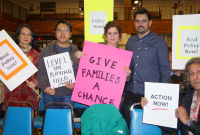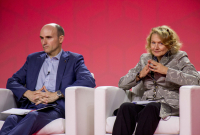Support strong Canadian climate journalism for 2025
In a city where a one-bedroom apartment rents for an average of $1,900 per month, some Vancouverites in urgent need of a home have a new alternative: a room in a portable housing development that took less than six months to build.
The first of an expected series of inexpensive, portable homes - designed to quickly increase shelter for poor residents -- was officially opened Thursday afternoon in Vancouver. Social Development Minister Jean-Yves Duclos flew in for the unveiling. He described the project as the beginning of what the federal government hopes will be many creative efforts to reduce poverty and homelessness across Canada.
In an interview with National Observer, he also signaled that "significant" investments were on the way for housing in the Trudeau government's spring budget.
“This is a new approach in Vancouver and a great example of how innovation and collaboration can lead to new housing options for all Canadians,” Duclos said at the launch.
The box-like building located on city-owned property across from Vancouver’s Science World, has room for 40 low-income residents. For $375 per month, they can rent a studio apartment with a window, a small kitchenette and room for a single bed and a few pieces of furniture. The project can be dismantled, packed up and moved to other locations as needed. The $3 million development was the first to receive financing from the federal government’s $200-million Affordable Rental Innovation Fund.
Project to quickly provide housing, says Vancouver Mayor Robertson
The aim is to quickly house people in need while more permanent units that take years to construct are in the works, said Vancouver Mayor Gregor Robertson.
“People will be moving in here much, much faster than most of the affordable housing projects that we do, which are more permanent obviously, but this enables us to get units open to people who are maybe on the streets, maybe in shelters,” he said.

In the interview, Duclos described the initiative as the beginning of an effort by the federal government to “significantly re-engage” with social housing after leaving it in the hands of the provinces for two decades.
After meetings with Metro Vancouver mayors and representatives of a non-profit that helps homeless youth, the minister spoke excitedly about initiatives to tackle poverty and housing challenges in the region. He described a clear need for federal assistance for such initiatives.
“This disengagement (in social housing) is creating severe problems,” Duclos said, noting how people had been pushed onto the streets by high and rising housing prices plus inadequate investment in social housing.
“Local governments ... are facing significant social and financial difficulties in looking after that housing stock,” he said.
Duclos also said he hopes the effort will help tackle poverty across the country and that the government’s upcoming National Housing Strategy will “establish how to make sure that a right to housing is properly addressed.”
Anti-poverty advocates are hopeful now
According to federal data, three million Canadians fell below the poverty line in 2014. In addition, over 655,000 Canadians households spent half or more of their income on housing that year. Nine out of ten of them had low income. In Vancouver, a count by the city in 2016 revealed that homelessness was at a 10-year high.
Vancouver anti-poverty advocates who spoke to National Observer said they were hopeful about the new developments.
“This is a piece of the puzzle that is warmly welcomed,” said Jeremy Hunka, spokesperson for the Union Gospel Mission, a non-profit that helps homeless people in Vancouver. “... But what we really need as well is permanent, affordable housing.”
Over the past two years, the Union Gospel Mission has had clients who were ready to move out of the Mission’s shelter and pay for rental housing, but couldn’t find any because of soaring rents in Vancouver, said Hunka. They stayed with the Mission, which, in turn, couldn’t bring more people off of the streets.

National efforts to increase social housing and reduce poverty may not be effective if B.C. does not develop it’s own poverty reduction plan, said Trish Garner, spokesperson for the coalition. “What we really need is a comprehensive strategy with legislated targets and timelines.”
Even so, Duclos said he hopes cities across Canada can learn from the housing initiatives in Vancouver.
“I would certainly like to single out the greater Vancouver area as a role model,” he said.







Comments
These statistics show over 10% of the population below the poverty line in 2104. The poverty line itself is so far below what resembles any reasonable, safe, or even healthy standard of existing (it does not allow for living, only barely existing) in today's world. I am not talking about all the mod cons, I mean safe, clean housing, healthy foods, affordable transit and dignity. Housing is one aspect of the larger crisis that governments, with their neoliberal agendas, are worsening. Full-time jobs with benefits are being replaced with part-time jobs without any benefits, or even the ludicrous zero pay "intern jobs". While companies reap more profit, we subsidize the medical, housing, and other social supports the people need to survive. Milennials are told to "get used to precarious employment". Some US states looked at special taxes for corporations like Walmart that were doing this, but I don't think they were able to gy them passed. Portland is going to raIse taxes on companies paying the CEO more than 100x more than employees. If we had decent employment laws requiring employers over a certain size to go back to full-time employees with benefits, and the minimum wage was standardized at $15 across the country, millions would be helped. Closing loopholes, giving the CRA some actual power and staff to collect the billions in tax fraud every year, is overdue and necessary to save our wobbling health care and other programs. Ending the sale of property to non-residents of Canada would go a long way to helping people get into existing properties and stop much of the housing fraud. End TFW until employment is below 1%. Canada and the rest of the world have to act on overpopulation and agree to negative growth in every country. Canada increased by over 1.5 million in 5 years mostly due to immigration. Despite high unemployment, increasing poverty, homelessness, recessions, lack of housing, inadequate transit systems, failing social programs, disappearing cropland, and failure to get anywhere near any climate goals. The plight of Indigenous communities seems to only matter when votes are needed and over a year into Trudeau's 5 year plan to end undrinkable water in 71+ communities, there have yet to be reports that any are fixed. CETA is expected to kill more jobs and worsen the situation for many, but we are just supposed to keep sucking it up.